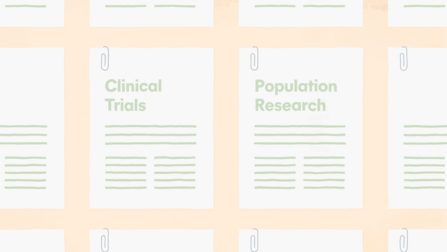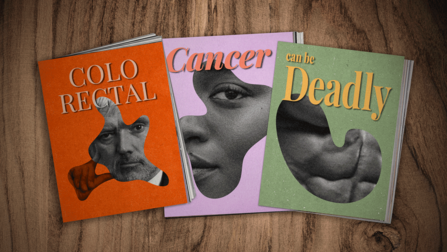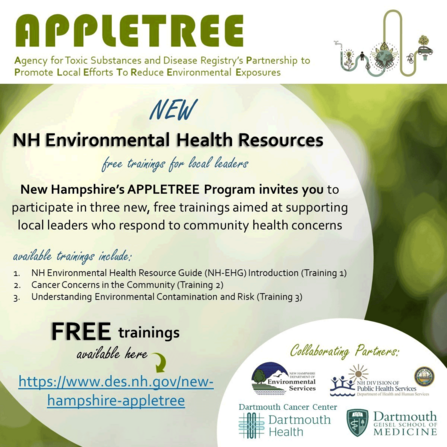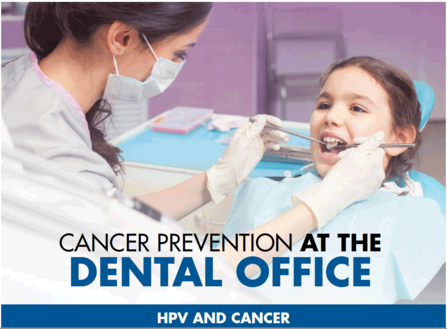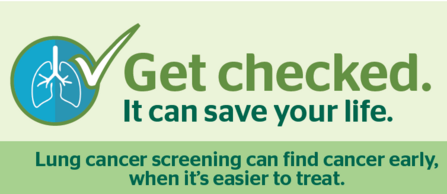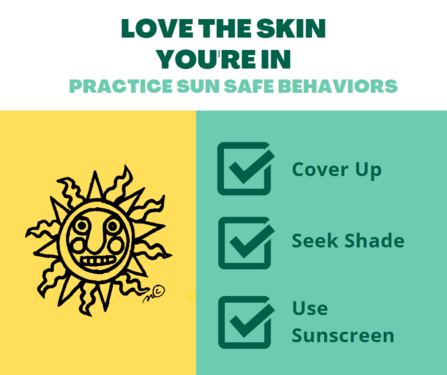This page provides a variety of resources to help prevent and control cancer in New Hampshire and Vermont. Please select the tools and resources below that you can use in your community.
Clinical trials: video
We develop new cancer treatments through clinical trials. Clinical trials are research studies where patients may be offered promising new therapies to see how well they work. Clinical trials should include a variety of patients from different backgrounds and environments.
We developed a video about cancer research working with community and clinical partners. The video teaches you how to explore clinical trial options.
This video has been tested in a research study. Among 260 people who viewed it, 90% said they planned to speak with their clinician about whether a clinical trial is right for them.
Questions? Contact DCC.Community.Outreach@dartmouth.edu
Funding acknowledgement
This video was developed with funding from the National Cancer Institute (P30CA023108).
Colorectal cancer screening: video
Colorectal cancer is a common and often deadly cancer. However, you can prevent it through cancer screening and healthy lifestyle choices—such as eating healthy, staying active, limiting alcohol, and not smoking.
With help from community and clinical partners, we developed a video to help people learn what they can do to:
- Prevent colorectal cancer
- Find it early
- Treat it when it's easiest
We tested the video in a research study. Among 174 people in the study who viewed the video, our study participants increased their:
- Knowledge about colorectal cancer risk factors
- Plans to exercise more
- Plans to eat healthier foods
- Plans to get screened for colorectal cancer
Questions? Contact DCC.Community.Outreach@dartmouth.edu
Funding acknowledgement
This video was developed with funding from the National Cancer Institute (P30CA023108).
Environmental health concerns: training videos
Risk factors in our environment, such as arsenic, radon, and pollution, can increase a person's chances of getting cancer. We often look to local community leaders to help us understand and address these concerns.
The videos below help local leaders respond to community environmental health concerns.
Trainings
- An Introduction to the New Hampshire Environmental Health Guide
- Cancer Concerns in the Community
- Understanding Environmental Contamination and Risk
Additional resources
To access additional resources related to environmental health concerns in NH, including the NH Environmental Health Guide, please refer to the New Hampshire APPLETREE website.
Questions? Contact DCC.Community.Outreach@dartmouth.edu
Funding acknowledgement
With receipt of federal funds from the Agency for Toxic Substances and Disease Registry (ATSDR), the APPLETREE Program at the New Hampshire Department of Environmental Services funded Dartmouth College to develop this set of trainings.
Partners
HPV vaccination: dental professional toolkit
Human papillomavirus (HPV) is a very common virus that most people will get at some point in their lives. HPV infections can cause six different kinds of cancer. Fortunately, there are safe and effective vaccines to prevent HPV.
HPV can cause mouth/throat cancer, known as 'oropharyngeal cancer.' So, dental professionals should speak with their patients about the HPV vaccine and other ways to prevent HPV.
We have developed toolkits for dental professionals to discuss HPV vaccination with patients.
New Hampshire toolkit
- Dental office poster (8.5" x 11") (PDF)
- Dental office poster (11" x 17") (PDF)
- Incorporating HPV vaccination status in your practice's patient health history (PDF)
- Patient brochure (PDF)
- Patient referral slip (1 per page, 8.5" x 11") (PDF)
- Patient referral slip (4 per page, 8.5" x 11") (PDF)
- Social media messages (PDF)
- Tips for talking about HPV with parents and patients at the dental office (PDF)
Vermont toolkit
Vermont toolkit materials can be accessed from the Dental/HPV Taskforce web page on the VTAAC website.
Questions? Contact DCC.Community.Outreach@dartmouth.edu
Funding acknowledgement
This set of materials was developed with funding from the National Cancer Institute (P30CA023108) and funding from the New Hampshire Department of Health and Human Services through the New Hampshire Comprehensive Cancer Collaboration.
Partners
Lung cancer screening: media materials
Lung cancer is easier to treat when it's found early through lung cancer screening. Talk to your doctor about getting screened for lung cancer if you're an adult:
- Between the ages of 50-80 years and smoke cigarettes
- Who has quit smoking in the past 15 years
We encourage you to use the following resources to help spread the message about lung cancer screening.
Questions? Contact DCC.Community.Outreach@dartmouth.edu
Funding acknowledgement
This set of materials was developed with funding from the National Cancer Institute (P30CA023108).
Partners
Sun safety: toolkit targeting middle schoolers
SunSafe in the Middle School Years improves sun protection behavior of middle school students (10 to 13 years old).
SunSafe in the Middle School Years toolkit materials
Overview materials:
- Presentation to prospective organizations (PDF)
- Kids' comments on the program (PDF)
- SunSafe in the Middle School Years program materials list (PDF)
School materials:
Community materials:
Manuals:
- Primary care practice manual (PDF)
- Sports coach manual (PDF)
- Recreational staff and lifeguard manual (PDF)
Handouts and giveaways:
- Sun safety and parent information sheet (PDF)
- Fun and sun family guide sheet (PDF)
- Sun safety bookmark (PDF)
- Sun safety sticker (PNG)
Facebook images:
Posters:
History of the project
Created in 2000, Ardis Olson, MD, directed the project and received funding from the National Cancer Institute. Her team worked with 10 communities throughout Vermont and New Hampshire, and included1:
- Coaches
- Healthcare providers
- Parents
- Schools
- Town recreation programs
Community members served as role models and educators to change youth's habits around sun screening. Compared to control communities, the study showed that youth in the intervention communities:
- Were more likely to use sunscreen and to apply it more thoroughly
- Reported receiving sun protection advice from more adults
- Protected more of their body from the sun
Why middle schoolers?
Middle school is an important time to work with youth. During this age, youth are making more independent health behavior choices. They are also willing to listen to adults' advice. Parents, teachers, and coaches can be role models.
- 80% of lifetime sun exposure occurs before age 18.2. Only 35% of middle school students protect themselves from sun damage.
- In 2019, 66% of Vermont middle school students reported having at least one sunburn in the past 12 months. The percent of students who had sunburns increased with each grade level.3
- One or more blistering sunburns in childhood or adolescence doubles the risk of developing melanoma later in life.4
- 84% of middle school youth understand protecting themselves from sun damage can prevent skin cancer. However, less than one-third (29%) use sunscreen, and only 7% wear a hat (data from baseline of study – unpublished).
Questions? Contact DCC.Community.Outreach@dartmouth.edu
Funding acknowledgement
This set of resources was originally developed with funding from the National Cancer Institute (R01CA079706) and was updated with support from the National Cancer Institute (P30CA023108).
Citations
- Olson, A. L., Gaffney, C., Starr, P., Gibson, J. J., Cole, B. F., & Dietrich, A. J. (2007). SunSafe in the middle school years: a community-wide intervention to change early-adolescent sun protection. Pediatrics, 119(1), e247-e256. Article on the American Academy of Pediatrics website.
- Cleveland Clinic (2022). Ultraviolet Radiation and Skin Cancer Page on the Cleveland Clinic website.
- Vermont Department of Health. (2020). 2019 Vermont Youth Risk Behavior Survey Report, 173. Statewide results report (PDF) on the Vermont Dartmouth of Health website.
- Skin Cancer Foundation. (2021). Sunburn & Your Skin. Page on the Skin Cancer Foundation website.
Additional resources
Looking for more great resources? Be sure to check out these partners' websites!
Free and reduced cost breast and cervical cancer screenings
Access information about FREE breast and cervical cancer screening and diagnostic follow-up services available to qualifying residents of New Hampshire and Vermont. Learn more about the services and qualifications by visiting your state's radon program.
Free radon testing
Access information about radon testing and mitigation, as well as a FREE kit to test your home's air radon level, by visiting your state's radon program.
Resources for cancer survivors and care partners
- American Cancer Society- This national organization provides information and various programs for cancer survivors, care partners, and others impacted by cancer, including:
- Dartmouth Cancer Center Complementary Care Program- Our Complementary Care Program offers FREE resources and support to cancer survivors and care partners, including classes, support groups, healing and creative arts, a mastectomy boutique, wig and cold cap resources, and more!
Resources for children of cancer survivors
Access local resources to support children impacted by their parents' cancer diagnoses.
- Camp Kesem (Dartmouth College Chapter) – Kesem is a free, week-long sleep-away camp for children 6-18 affected by a parent's cancer diagnosis.
- Mahana Magic – This Vermont-based organization provides services, programming, and resources to support children 2-18 whose parents have been diagnosed with cancer.
Information and resources for public health partners
Learn about your state's goals and efforts to reduce cancer across your state and connect with partners working toward this mission.
